|
|
|
Sort Order |
|
|
|
Items / Page
|
|
|
|
|
|
|
| Srl | Item |
| 1 |
ID:
166506
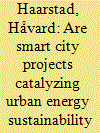

|
|
|
|
|
| Summary/Abstract |
The purpose of this paper is to investigate the links between smart cities and urban energy sustainability. Because achieving a “smart city” is a wide agenda rather than a specific set of interventions, smartness itself cannot easily be measured or quantifiably assessed. Instead, we understand smart cities to be a broad framework of strategies pursued by urban actors, and ask whether and how smart city projects catalyze urban energy sustainability. We use case studies of three cities (Nottingham, Stavanger, and Stockholm) funded by the Horizon 2020 Smart Cities and Communities program and examine how urban energy sustainability was advanced and realized through the smart city initiatives. We find first that while sustainability is not always a major objective of local implementation of smart city projects, the smartness agenda nevertheless increases the ambition to achieve energy sustainability targets. Second, the sustainability measures in smart cities are rarely driven by advanced technology, even though the smart city agenda is framed around such innovations. Third, there is significant sustainability potential in cross-sectoral integration, but there are unresolved challenges of accountability for and measurability of these gains.
|
|
|
|
|
|
|
|
|
|
|
|
|
|
|
|
| 2 |
ID:
117881
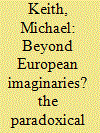

|
|
|
|
|
| Publication |
2013.
|
| Summary/Abstract |
This article suggests that a politics of difference demands a recognition of a paradox of universal welfare and a paradox of pirate modernities. The former rests on the fiscal cartography of institutional governance. The latter rests on a reframing of the notion of arrival in an age of globalisation. Both would benefit from an analytical blurring of perspectives that privilege the everyday world of cities of the Global South and those of the Global North.
|
|
|
|
|
|
|
|
|
|
|
|
|
|
|
|
| 3 |
ID:
184237
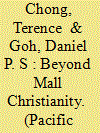

|
|
|
|
|
| Summary/Abstract |
The global spread of Pentecostalism has been facilitated by a combination of transnational impulses and indigenizing interests. In the case of independent Pentecostal megachurches, their growth in urban centres is reflected in both Western and Asian societies. Megachurches in America and Southeast Asia have flourished because of their unique blend of middle-class congregants, appeal to consumerist and popular culture, as well as their compatibility with the urban lifestyle patterns of their congregants. However, it would be a mistake to assume that the drivers of growth and the conditions behind the common features of these megachurches are the same. Examining Jakarta, Surabaya, Kuala Lumpur, and Manila, we show that megachurches are not located in shopping malls and commercial complexes merely for growth purposes or to align with the consumerism ethos of capitalism. Deeply local concerns, such as hostile neighbourhoods dominated by Muslim or Catholic majorities, have led to the camouflaging of Christian symbols in urban settings. The purposeful targeting of youth also reveals the Southeast Asian megachurch engaging with the new urban mobilities triggered by rapid economic development. We conclude that the Southeast Asian city’s structure and layout are being repurposed by Christian innovation and reinterpretation. Christianity in the Southeast Asian city is hidden in plain sight.
|
|
|
|
|
|
|
|
|
|
|
|
|
|
|
|
| 4 |
ID:
165939
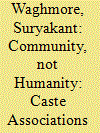

|
|
|
|
|
| Summary/Abstract |
This paper explores the nature of urbanism that caste associations seek to construct in the metropolis of Mumbai. To this end it asks: what role do caste associations play in the cosmopolitanism(s) of Mumbai? How do they help individuals negotiate cosmopolitan urbanism? What is the nature of the civility and public-ness they aspire to and work towards? What are the challenges they face? I suggest that caste associations of the ‘pure’ and ‘privileged’ work towards achieving an ideal of Hindu cosmopolitanism. Such associations may seem to be ‘bad’ cases of cosmopolitanism because they achieve a certain kind of limited openness and tolerance while continuing caste closure. However, they attempt to provide cultural roots to consumerist individuals in the urban environment. The challenges facing caste associations point both to the limits of urban Hindu cosmopolitanism as an ideal and social practice and to the lack of alterity as a necessary moral value for Hindu cosmopolitanism.
|
|
|
|
|
|
|
|
|
|
|
|
|
|
|
|
| 5 |
ID:
190344
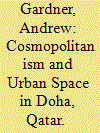

|
|
|
|
|
| Summary/Abstract |
This essay commences with an ethnographic sojourn through the Industrial Area, a peripheral zone of the urban landscape in Doha, Qatar that is densely inhabited by low wage migrant laborers. In this segregated urban enclave, I ascertain the openness to alterity and the interactions with difference that connect their experiences to the conceptual legacy of cosmopolitanism. Via a discussion of the segregated experiences of transnational migrants in Doha’s urban landscape, I then stake out a speculative argument for the connection between that segregation and the resulting cosmopolitan conditions. Together, these two assertions explore manifestations of cosmopolitan urbanism in non-Western and non-democratic cities. In the conclusion to this essay, I suggest that we might usefully disentangle our assessment of these cosmopolitan conditions from our sustained critiques of the global landscape of inequality, and turn my attention briefly to the western ethnocentricities that suffuse the analytic lens by which we gauge cosmopolitanism and the city.
|
|
|
|
|
|
|
|
|
|
|
|
|
|
|
|
| 6 |
ID:
189544
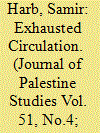

|
|
|
|
|
| Summary/Abstract |
This article looks at cement as a vital material in the process of urbanization. It specifically addresses urban metabolism, examining the intricacies of the cement circulation network in the occupied Palestinian territories (oPt) during the post-Oslo period. Because of Israel’s near-total control of land and natural resources in the oPt, there is still no fully integrated Palestinian cement plant there, making the Palestinian construction sector highly dependent on imports from Israel’s Nesher cement factory. This article argues that controlling the circulation of cement constitutes sovereignty over the processes of urbanization. In the current context, the cement circulation system that is effectively controlled by Israel is characterized by exhaustion, resulting in Palestinian urban geography’s perennial metabolic insufficiency.
|
|
|
|
|
|
|
|
|
|
|
|
|
|
|
|
| 7 |
ID:
173414
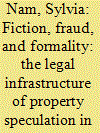

|
|
|
|
|
| Summary/Abstract |
Through the standardization of property as a commodity, real estate speculation in Phnom Penh has flourished and has included foreigners, for whom Cambodian real estate property is constitutionally off-limits. This essay outlines some features of Cambodian law to highlight the contours of the country’s deep legal pluralism, as well as to describe how law is part of the way property has been remade as a market commodity. “Legal fictions” – technical devices and shell companies – give access to Phnom Penh’s real estate market. The use of legal fictions in Cambodia’s economy is widespread and, crucially, structures property ownership and its distribution. In the process these devices work to veil ownership in plain sight and skew access to property to those who can utilize this effectively.
|
|
|
|
|
|
|
|
|
|
|
|
|
|
|
|
| 8 |
ID:
130873
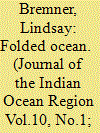

|
|
|
|
|
| Publication |
2014.
|
| Summary/Abstract |
This paper presents experimental research on the Indian Ocean being undertaken within the context of what has been termed architecture's contemporary geographic turn. It investigates how oceanic practices and protocols fold into spatial and architectural products on land, figuring both sea- and land-based logics. It frames this ocean through three tropes: as contact zone, with which are associated ideas of creolisation, transnationalism, entanglement, compaction and multi-polarity; as circulator with which are associated ideas of connectivity, passage, lane, route, choke point, network, port, dock and deposit; and as ecology, with which are associated ideas of liquidity, cycle, rhythm and climate change. The paper introduces these tropes and investigates sites brought into focus through them, highlighting the wider global dynamics or processes they reveal. It concludes with provisional thoughts about what these amphibious sites offer for understandings of architecture and urbanism in today's hyper-articulated, globalised world.
|
|
|
|
|
|
|
|
|
|
|
|
|
|
|
|
| 9 |
ID:
144349
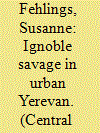

|
|
|
|
|
| Summary/Abstract |
This article focuses on a recent development in the Armenian capital, Yerevan, described by its urban population as a ruralization process. I explore what it means to call something or someone ‘rural’ or ‘urban’, and I compare the social category of ‘rural people’ with the social category of the (old) urban intelligentsia. This includes an analysis and reconsideration of the traditional ‘nature–culture dichotomy’ and its meaning for the architecture and urban planning of Yerevan. It also interrogates the classification of people into newcomers from the countryside, urban dwellers, new elites, and young men called rabiz.
|
|
|
|
|
|
|
|
|
|
|
|
|
|
|
|
| 10 |
ID:
159255
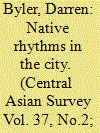

|
|
|
|
|
| Summary/Abstract |
Over the past two decades, state-directed Han settlement and capitalist development in the Uyghur homeland in Chinese Central Asia have uprooted thousands of Uyghurs, causing them to move to the city. In this article, I explore how low-income male Uyghur migrants and Uyghur culture producers build a durable existence despite these challenges. Based on analysis of migrant responses to the Uyghur-language urban fiction and indigenous music as well as ethnographic observations of Uyghur migrants from Southern Xinjiang, I argue that indigenous knowledge provides underemployed male Uyghurs a means to refuse the alienating effects of settler colonialism and economic development. By broadening the scope of what counts as ‘resistance’ to Chinese attempts to eliminate aspects of Uyghur society, I show that ‘refusal’ can be a generative way of embodying sovereignty, particularly when confronted by structural violence.
|
|
|
|
|
|
|
|
|
|
|
|
|
|
|
|
| 11 |
ID:
101253
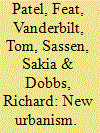

|
|
|
| 12 |
ID:
115038
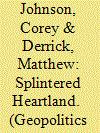

|
|
|
|
|
| Publication |
2012.
|
| Summary/Abstract |
Much has been made about a revival of Mackinderian geopolitics in Eurasia, largely centred on struggles over access to energy resources and rooted in a territorial understanding of space. This paper proposes that the conceptual political cartography of Eurasia is indeed largely being rewritten, but conventional understandings of space, territory, and resources are insufficient in providing insight into a changing geopolitics. We interrogate the geographical logics of Russia's role as energy provider to Europe by focusing specifically on the provision of gas to Europe via Nord Stream, a new underwater pipeline that is scheduled to go online by late 2011. Drawing on debates in human geography on relational/topological views of space, and on the "splintering urbanism" thesis, the paper describes a rapidly evolving networked space that effectively "splinters" the territorial integrity of the region and thereby complicates notions of Eurasian geopolitics that emphasise proximity, territorial hegemony, and state-centric international relations.
|
|
|
|
|
|
|
|
|
|
|
|
|
|
|
|
| 13 |
ID:
156692
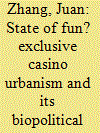

|
|
|
|
|
| Summary/Abstract |
This paper interrogates the exclusionary politics of casino urbanism in Singapore, especially in terms of how this particular brand of urbanism reproduces disciplinary regimes through the uneven consumption of fun and leisure. Singapore’s vision of becoming a world-class “state of fun” is accompanied by increasingly sophisticated measures of boundary making between global leisure citizens and the excluded others, often comprised of the working class and those deemed to be at risk or lacking self-control and responsibility. The evolving biopolitical borders coincide with the multiple borders set up around Singapore’s casino spaces, ensuring the exclusive consumption of Singapore’s casino urbanism by the wealthy few. The fun regimes help to normalize social exclusion, moralize disciplinary control, and give legitimacy to the new class of global consumers under the operations of the state-capital apparatus. This paper argues that exclusive casino urbanism has broader social and political implications on issues of equality, accessibility, and urban participation.
|
|
|
|
|
|
|
|
|
|
|
|
|
|
|
|
| 14 |
ID:
101257
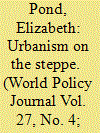

|
|
|
|
|
|
|
|